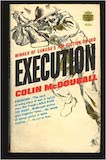The only Canadian soldier to be executed during (… actually well after!) World War II, Harold Pringle, caught a fusillade in Italy on this date in 1945.
A 16-year-old — he fibbed about his age — enlistee from small-town Ontario, Pringle joined the Hastings and Prince Edward Regiment.
Pringle and a mate in the Hasty P’s name of “Lucky” MacGillivray linked up with some British deserters to form a black market outfit in conquered Rome. The “Sailor Gang”* enjoyed several weeks of picaresque living in the lawless city. Unsurprisingly, as Allied military authorities got control of the place they were eager to make examples of these minor gangsters. (Major gangsters were a different matter.)
The shooting death of that mate MacGillivray gave military prosecutors the means to sink the Sailors. One of their number was induced by a sweetheart deal to finger Pringle as for murdering him. Pringle and his comrades all contended that “Lucky” had been shot by mischance during one of the outlaws’ frequent drunken bouts, and having died en route to the hospital, Pringle shot him up posthumously in hopes of making the body look like it had been prey to a gang hit.
Despite all the trouble taken to secure a very dubious conviction, the execution itself was carried out in great secrecy by a tiny rump contingent of Canadians — all their fellows had already been withdrawn from Italy — who were not to speak of it afterwards.
According to Andrew Clark, the author whose research revealed the event to the wider public in A Keen Soldier: The Execution of Second World War Private Harold Pringle, it all came down a political balancing act. Canadian Prime Minister William Lyon Mackenzie King faced a June 1945 election (followed by formation of a coalition government) that a controversial execution might complicate.
However, the British had executed two of their guys in the Sailor Gang case, and reciprocity was expected on a diplomatic level. So the solution was to do it as quietly as possible, and cover it with an official secret designation. Even Pringle himself didn’t find out his sentence was confirmed until the morning of the execution.


Left: The classic antiwar novel inspired by the Pringle case, which was the only novel published by Colin McDougall. Right: The 2002 nonfiction treatment that brought the affair to the public eye. Below: A 1955 episode of Four Star Playhouse also seems to be based on the Pringle case, and Colin McDougall is credited with the story.**
There’s a riveting audio interview here with a member of the Hastings and Prince Edward Regiment who had guard duty on the condemned youth on the last night of his life. “Just as brave as could be,” Orville Marshall reports.
* There’s another infamous troupe of deserter-gangsters operating in Rome in this same period, the Lane Gang. The said “Lane” — whose real name was Werner Schmiedel — was hanged by American authorities in June 1945.
** McDougall served in Italy up to the end of Canada’s involvement there, and that is surely how he came to know about the secret execution in a general sense; any more specific vector of information appears to be unknown. However discovered, Pringle clearly haunted McDougall: he took several years to write his magnum opus, and also published a short story in McLean’s in the early 1950s called “The Firing Squad”.
On this day..
- 2010: Akram al-Samawi
- 1530: Johnnie Armstrong, border reiver
- 1723: Thomas Athoe the Elder, and Thomas Athoe the Younger
- 1453: The garrison of Poucques, Jacques de Lalaing's cannonball killers
- 2007: Jafar Kiani, stoned
- 1731: Jose de Antequera, Paraguayan comunero rebel
- 1655: Grete Adrian, Ruethen witch
- 1691: Jack Collet, sacrilegious burglar
- 1983: Aleksandr Kravchenko, in Chikatilo's place
- 1917: Gasim, by Lawrence of Arabia
- 1600: Jean Livingston, Lady Waristoun
- Themed Set: The Ballad
- 1947: Ding Mocun, not as hot a lay in real life
